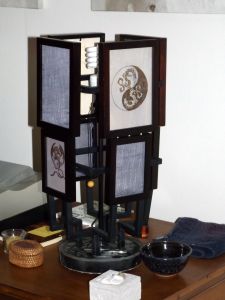“Complete the motion if you stumble.”
– The Red Hot Chili Peppers
I built the above lamp with my boyfriend over the course of a year. We named it Dragon Glass, after the dragon images we wood-burned for it, and the mirror and ice resin used as the base.
We started early in our courtship, shortly after we met. We had the idea to do something simple with decorating a lamp shade. But as sometimes happens with little projects, things got out of hand.
Upon finishing we both noticed one significant concern:
It’s crooked.
We’d measured everything three times. We cut, sanded, painted, and glued it together piece by piece. We finished by spraying it with resin for the professional touch. We envisioned a fancy, straight lamp, one that reflected the time and money that went into it.
But we didn’t account for how certain components would fit together, which changes the location of their center by about half an inch. Enough to make the entire structure askew, and prevent the woodburnings and screens from sliding neatly into place.
This situation led me to the following life lesson:
The cause of the problem is often much smaller than the problem itself.
In fact, only two parts are to blame for the entire structure’s misalignment. Yet the effect is such it looks like all of our measurements are off.
If this were something more meaningful to my life than a lamp, say my career, money, health, relationship, etc. it might be very hard to recognize the simplicity of what was amiss when faced with the deeply askew effects.
My reaction would likely be at the level of the difficulty experienced, instead of the level of its cause. For that reason improving it could feel like a Herculean task beyond my scope. I’d get overwhelmed, and alternate between pumping myself to do something about it and falling flat with a feeling of “just give up.”
In a previous article I wrote about how little, easy things are the secret to lasting positive change. Here I’ll add to that sentiment.
Tuning into the specifics of what’s needed in a given situation, regardless of how you feel about it, puts you in alignment with what is and surrenders the fear of failure.
Then you can explore the little, easy things that directly relate to making more money, improving your relationship experience, or whatever else is asked for.
More often than not we overreact to the things in life that are “off”, giving them more energy and time than they warrant. It becomes the equivalent of launching nuclear weapons to kill a mouse. It’s both exhausting and ineffective.
Here are some universal practices to help you tune into what’s needed and step out of the reflex to struggle:
1. Slow down.
The faster your mind moves spinning in circles, the more inertia and effort becomes associated with the situation.
2. Breathe slowly and deeply.
This calms your nervous system, and invites higher, non-reactive brain function.
3. Ask, “What am I not seeing?”
The cause is often small, and therefore seems subtle compared to the drama of undesired effects. Ask this question without trying to come up with the answer. Use it to help you listen to the situation, and see things you might otherwise ignore because they don’t seem important.
4. Ask, “What is the most useful thought I can have about this situation?”
This question draws on the wisdom of the mind. Thoughts in alignment with what is actually called for in the situation will then surface, proactive and not reactive.
The “solution” is usually creative and at peace with what is. In my experience, it rarely looks like taking out the pieces that don’t work, fixing them, and put them back in.
In the case of Lampy (Dragon Glass’ name during the construction phase) doing so would take a lot of time and not be fun, so we decided to instead add to what we created in ways that take advantage of its shape. There will soon be a multicolored fabric in the center that gives purpose to its unintended visibility, and allows the lamp to emanate a soft purple glow in alignment with its decorative purpose.
Other changes are also in the works that are easy to do, and will enhance the benefit of its crooked nature.
Life is going to go awry. Things will happen you don’t like. You’ll do everything right, plan in detail, and some little thing you can’t anticipate will throw things off. That’s a universal truth.
Responding appropriately is an art. Listen to what’s called for and give it. It’s a lot easier and takes a lot less time than stressing about what’s wrong.









Leave A Comment